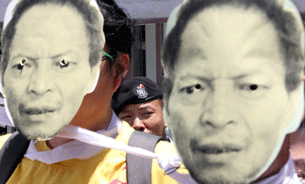China: Hunan activist under house arrest
| Publisher | Radio Free Asia |
| Publication Date | 1 February 2013 |
| Cite as | Radio Free Asia, China: Hunan activist under house arrest, 1 February 2013, available at: https://www.refworld.org/docid/511ce45423.html [accessed 1 June 2023] |
| Disclaimer | This is not a UNHCR publication. UNHCR is not responsible for, nor does it necessarily endorse, its content. Any views expressed are solely those of the author or publisher and do not necessarily reflect those of UNHCR, the United Nations or its Member States. |
2013-02-01
Chinese activist had questioned the verdict of 'suicide' in the case of a friend who died in police custody.
 A police officer looks at protesters wearing masks of the late Chinese dissident Li Wangyang in Hong Kong, July 15, 2012. AFP
A police officer looks at protesters wearing masks of the late Chinese dissident Li Wangyang in Hong Kong, July 15, 2012. AFP
A close friend who questioned the official verdict of suicide in the death of late veteran labor activist Li Wangyang has been put under house arrest in the central Chinese province of Hunan, following several months' detention on suspicion of subversion.
Zhu Chengzhi, 62, was one of Li's most active supporters in the wake of his June 6, 2012 death in police custody at a hospital in Hunan's Shaoyang city, which the authorities said was suicide, but which was questioned as highly suspicious by many friends and online activists.
"I have just got back home," Zhu said in a brief interview on Friday. "But everything is the same as it was seven or eight months ago."
"It's residential surveillance, which means there are some restrictions on me, for example when I go online, what I'm allowed to search for."
"There are certain conditions to this residential surveillance, and if I break them, they can detain me again," Zhu said.
Zhu said he was in good physical and mental health following his 238 days of detention.
Asked if he would continue his activism on his friend's behalf, he replied: "Everything I did before was as an ordinary citizen, and that is how it will be in future, too."
'Tight restrictions'
Zhu was detained on suspicion of "incitement to subvert state power" last year amid a government crackdown on Li's family and friends, which came after they challenged the official account of his death and its immediate aftermath.
Beijing-based rights lawyer Liu Xiaoyuan, who is acting as Zhu's legal representative, said Zhu would be allowed to leave home, but only under certain circumstances.
"He is under very tight restrictions under this residential surveillance," Liu said.
"They can stop him from meeting with anyone they specify, and he can't leave his home city without seeking their approval first."
"These are the provisions under [China's] criminal law."
Activists said the downgrading of Zhu's detention to residential surveillance was likely linked to a huge public outcry over Li's death, and over Zhu's subsequent detention.
Liu said the authorities in Zhu's home city of Shaoyang had probably come under pressure from higher authorities as a result.
"They should let him home because it is nearly Spring Festival," Liu said, referring to the Chinese New Year celebrations, when families traditionally get together.
"But the case against him isn't over," he added. "They will definitely continue to process his case at the [state prosecution service], although the prosecution could decide that there is insufficient evidence."
High-profile campaign
Shanghai-based democracy activist Wang Jianhua said he believes the high-profile international campaign had led to Zhu's return home.
"If there had been no campaign among the people, they wouldn't have let him out," Wang said. "We forced the government to let him go, because he is innocent."
"All he did was tell the truth."
When relatives arrived at the scene of Li Wangyang's death, his body was hanging by the neck from the ceiling near his hospital bed, but was removed by police soon afterwards.
Relatives, friends, and rights groups have all called into question several details of both circumstance and timing which they say point to the possibility of foul play, including photographs distributed on the Chinese microblog service Sina Weibo, which showed Li's feet touching the floor.
Police took away Li's body after his death was discovered and kept it in an unknown location, Li's relatives said.
A Chinese police investigation into Li's death upheld an earlier verdict of suicide, in spite of widespread public doubts over the claim that the severely disabled 62-year-old hanged himself.
Reported by Qiao Long for RFA's Mandarin service and by Lin Jing for the Cantonese service. Translated and written in English by Luisetta Mudie.
Link to original story on RFA website
